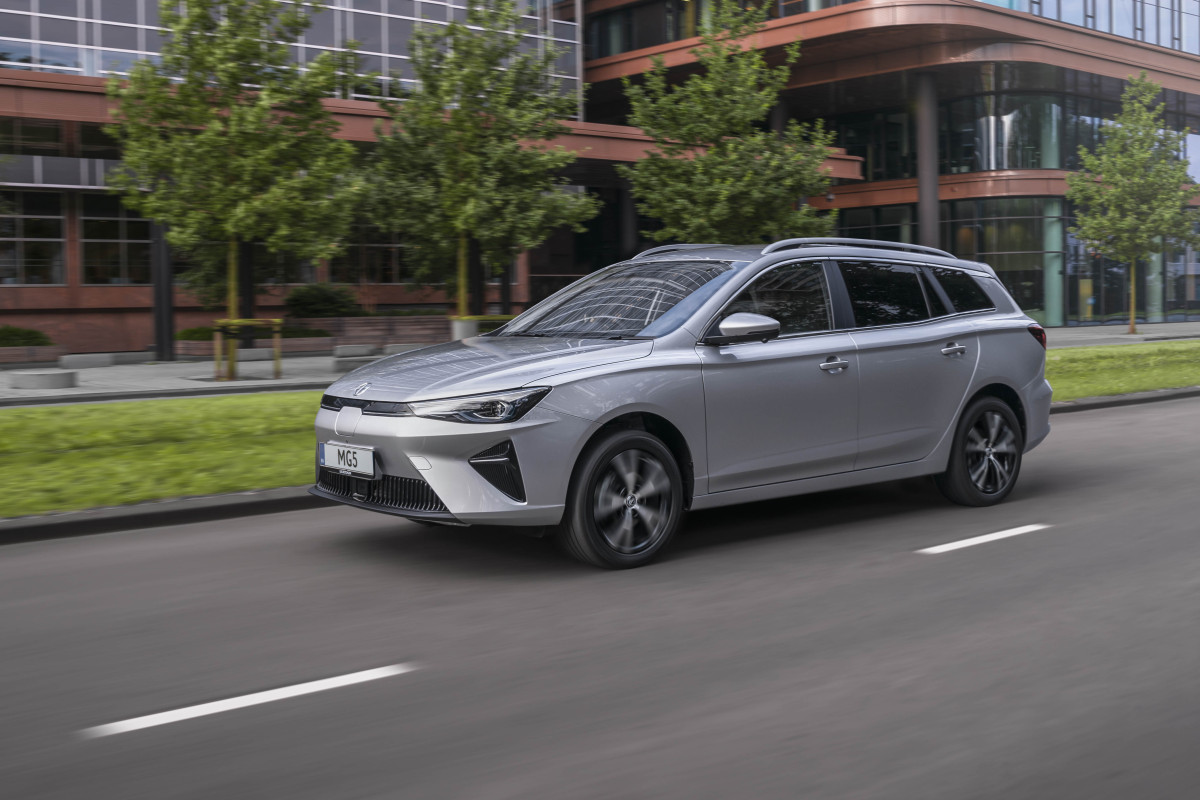
Germany saw new-car registration return to growth in October. This followed a small market drop in September, not helped by changes to electric-car purchase incentives.
According to new data published by the Kraftfahrt-Bundesamt (KBA), a total of 218,959 new cars were registered in Germany last month, marking an increase of 4.9% from October 2022. While private registrations increased by 6.7%, businesses and fleets made up the majority of the market last month at 63.9%.
Germany’s October registration results were also the weakest of the big five European markets. France, Spain and Italy, as well as the UK, all posted stronger double-digit growth figures.
From January to October, the entire German new-car market recorded 2,357,025 registrations, equating to a year-on-year growth of 13.5%. However, when compared with the pre-COVID-19 levels of 2019, Germany’s new-car numbers were down 22.1%.
No reverse in trend
After several turbulent months, battery-electric vehicle (BEV) registrations in Germany appeared to reach calmer waters in October. A total of 37,334 new all-electric models took to the country’s roads last month, up 4.3% year on year, capturing a market share of 17.1%.
Business BEV purchase incentives were withdrawn at the beginning of September. This resulted in a large number of all-electric registrations being pulled forward, as companies rushed to take advantage of favourable rates. The powertrain saw registrations increase by 170% in August ahead of the change, which was then followed by a 28.6% slump in September.
‘October brings a temporary autumnal ray of hope in new registrations, but we cannot see a turnaround in the trend in the automotive trade,’ said ZDK vice president, Thomas Peckruhn.
‘The slight increase in battery-electric cars can be attributed to the beginning of the final push for the environmental bonus, which will be reduced from 1 January 2024. However, the willingness to buy has not increased dramatically and customers are still very reluctant,’ he added.
Petrol still leads
Elsewhere in the electric-vehicle (EV) market, plug-in hybrids (PHEVs) continued to sink in popularity. Only 16,361 new PHEVs hit the road last month, resulting in a year-on-year fall of 49%. So, while BEVs made up 17.1% of the new-car market, PHEVs accounted for just 7.5%.
Combined, full and mild hybrids recorded 57,575 registrations in October, up 57.9%, to claim 26.3% of the market. Just 1,089 new cars were powered by liquid petroleum gas (LPG), up by 17.5%, while 65 units were fuelled by natural gas (down 48.4%). This meant the total gas powertrain market share reached 0.5% last month.
Petrol continued to lead the market with 71,646 units registered, up 7.5%, with the powertrain securing a market share of 32.7%. Meanwhile, diesel continued its decent, accounting for 15.9% of new-car registrations with 34,881 new units hitting the roads, down 4.6% on October 2022.
Production under pressure
According to a survey conducted by the ifo Institute, Germany’s automotive climate cooled from September to October. ‘Companies in Germany’s automotive industry rate their current business situation as significantly worse than in the previous month,’ said Anita Wölfl, a specialist at the ifo Centre for Industrial Organisation and New Technologies.
While expectations for the coming months did improve slightly, hopes remained broadly subdued. There was a marginally more confident assessment of the situation regarding vehicle orders, even though there was a slight shrinkage in current work. ‘However, the automotive order backlog is still quite high compared to the long-term average,’ Wölfl added.
Meanwhile, the Association of the Automotive Industry (VDA) found that 85% of suppliers and medium-sized manufacturers it surveyed felt heavily burdened by bureaucracy. Many of these companies said the effort involved in completing non-value-adding reports has increased, taking up time and generating costs.
Energy costs were also a major concern. Over 70% of respondents said they were heavily or very heavily burdened by the high price of electricity, while 59% said they continue to be severely or very severely challenged by the cost of gas.
The VDA’s survey also revealed that investment plans are shifting. More than one in three companies surveyed reported plans to invest outside of Germany. Relocation destinations included other EU countries, Asia, and North America. A further 14% of companies claimed to be looking to cut back on investments, while only 1% stated they wanted to increase funding figures in Germany.
‘Our survey clearly shows that medium-sized automotive companies in Germany suffer immensely from excessive bureaucracy and high energy costs,’ said Hildegard Müller, president of the VDA. ‘The fact that more and more companies are shifting investments abroad is a warning signal for Berlin. It is important to take countermeasures and replace regulatory small-scale with long-term strategies for more competitiveness.’

The German government must be on guard in 2024 to ensure it can meet its increasingly distant target of having 15 million electric cars on the road by 2030, says Wiebke Zimmer, deputy executive director of clean mobility think tank Agora Verkehrswende. Measures such as ending tax rebates on diesel fuel could help the climate as well as the tight budget, Zimmer told Clean Energy Wire in this interview, adding that the social aspects of the shift to clean mobility will be a focus at the EU level in the new year.
This interview is part of a series to preview the German and European energy and climate policy in 2024. The other interviews will be published in the coming weeks.
Clean Energy Wire: What priorities should the German government set to advance climate protection in the transport sector in 2024?

Wiebke Zimmer: The development of the passenger car fleet signals a risk that the government target of 15 million electric cars by 2030 could be missed. Achieving this is central to climate protection in the transport sector. It is therefore all the more important that the German government monitors the market ramp-up and takes appropriate measures early enough if interim targets are not met. Reforms to vehicle and company car taxation would be effective, for example. A lot could also be gained for climate protection – as well as the tight budget — by reducing other climate-damaging subsidies, such as the lower taxation levels on diesel, and the commuter allowance. The railway infrastructure must be comprehensively renovated and made fit for the future in order to increase public transport passenger numbers. The federal and state governments must also work together to secure funding for the maintenance and expansion of local public transport in order to close gaps in services.
The political year 2024 in Europe will be dominated by the EU elections in spring. In your opinion, which climate and energy policy measures are particularly important for the EU in the near future and should be prioritised?
First of all, it is important for the European Parliament and the responsible ministers of EU Member States to finalize the revision of the CO2 standards for emissions for new heavy-duty vehicles, setting ambitious CO2-reduction targets leading to a 90 percent reduction by trucks in 2040. The future of trucks is electric, and any loopholes related to the continued use of synthetic fuels are not helpful, since these fuels are needed for shipping and aviation.
In addition to that, the Commission should also assess and ensure that Member States implement the Green Deal uniformly and timely across Europe, specifically when it comes to the construction of charging infrastructure for trucks.
Lastly, the next European Commission should encourage EU Member States to implement car taxation policies that incentivize the uptake of electric vehicles, encourage small energy and resource efficient vehicles, and increase the tax burden for internal combustion engine cars.
What other issues and events in Germany and beyond do you think will — or should — shape the debate in your field in the coming year (and why)?
Mobility poverty and the social justice of climate and transport policy measures will become even more relevant if the prices of fossil fuels increasingly include the costs of climate damage. Germany’s strong focus on the car, therefore, harbours major social risks. This makes it all the more important to address the issue of mobility poverty more intensively next year, and to develop and implement measures that promote social participation and climate protection at the same time.
Road traffic law continues to be a pressing issue for cities and municipalities. More and more of them are demanding greater room for manoeuvre in order to improve road safety, quality of life and climate protection. Now that the long-negotiated reform has been overturned at the last second in the Council of member state governments (Bundesrat), everything is back to square one — and the municipalities will not accept this in 2024 either.















